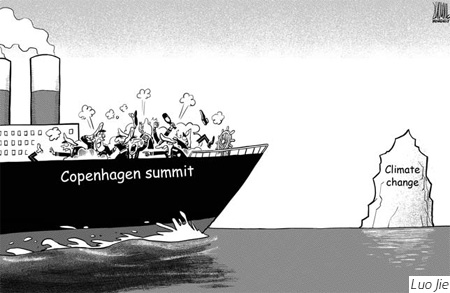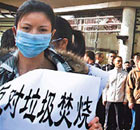Government and Policy
Premier Wen's 60 hours in Copenhagen
(China Daily)
Updated: 2009-12-26 09:34
 |
Large Medium Small |
|
 |
Editor's note:
Xinhua correspondents Zhao Cheng and Tian Fan, who accompanied and covered Premier Wen Jiabao's tour to the Copenhagen climate talks last week, recall in this following special report what they witnessed at the summit in the Danish capital. With close-in observations of Premier Wen's tight schedule and meetings with world leaders, their account is expected to shed light on some queries concerning the conference.What did Premier Wen tell world leaders?
Why was Premier Wen missing from a mysterious small group meeting called by the United States?
How was Copenhagen Accord finally reached after long, tough negotiations?
Chinese Premier Wen Jiabao left Beijing for the climate summit in Copenhagen, Denmark on Dec 16, when pessimism and disappointment were simmering among negotiators. For most developing countries, the ideal outcome of the talks should be a legally-binding political document based on the successful conclusion of the negotiations on two important document spelled out in the "Bali Roadmap", the Long-term Cooperative Action and amendments to the Kyoto Protocol.
"It will be a tough task. Now I can feel how heavy my duty is to attend the meeting on behalf of the Chinese government," Wen told reporters aboard his plane en route to Copenhagen.
Nevertheless, Wen said he was confident that the talks would bear fruit. "As so many world leaders are gathered there, I believe there should come some achievements," he said. "No matter what the result is, China's action plan will not change, its voluntary reduction target will always be non-negotiable, and its determination in hitting the target will never waver."
Talks with world leaders
Premier Wen's schedule on Dec 17 was almost fully occupied by meetings with world leaders.
During the meeting with Danish Prime Minister Lars Lokke Rasmussen, Wen suggested that in order to achieve an outcome for the conference, all parties should stick to the consensus they had reached while leaving differences for future negotiations. "Now it seems to be the only way out. If we can reach a resolution of such a kind, it could well be an achievement of the talks," Wen said.
In his talks with UN Secretary-General Ban Ki-moon, who expressed that a fruitless conference would be unacceptable, Wen proposed to formulate a political document that may reflect the consensus of different parties.
"It is unrealistic to hope to fill in the gap between nearly 200 countries in less than two days. China and the people of the world all wish for the success of the meeting, and the current priority is to crystallize a consensus," Wen said.
He told the UN chief it was important to fix the political aspiration to deliver confidence and hope to the world.
The drafting of the final document must be transparent while concerns of different parties, especially developing countries, must be taken into consideration, Wen stressed.
Wen's talks with Ban was followed by the meeting with Brazilian President Luiz Inacio Lula da Silva. They agreed that the two major developing countries must firmly stand with other developing countries to safeguard their common interests.













